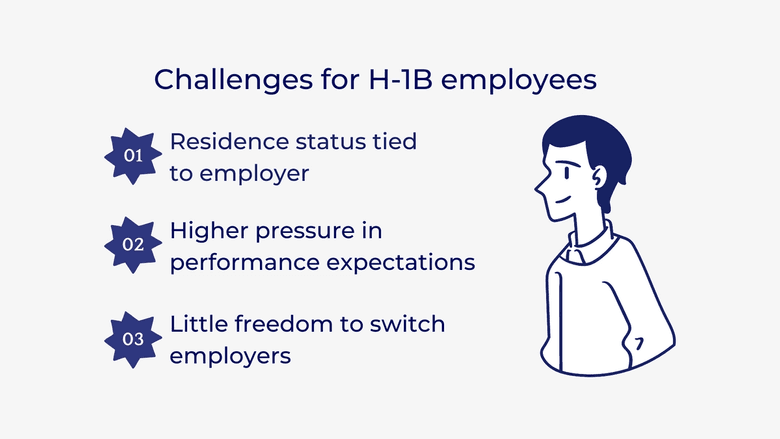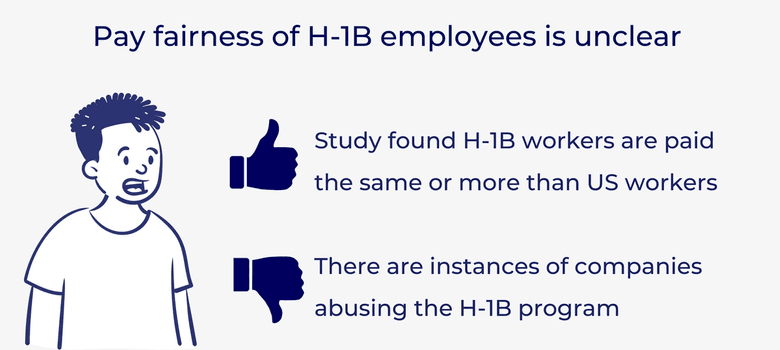Are H1B Visa Holders Mistreated in Tech?
H1B Visa holders face additional constraints in the workforce. Here's why.
National conversations about the United States’ H-1B visa have ramped up in recent news after Trump’s latest executive order, which aimed to prevent employers from replacing American employees with H-1B immigrants. According to an article in Forbes, although the order didn’t present a significant policy change, it signified Trump’s continued opposition of the H-1B program.
The H-1B visa is reserved for individuals with the American equivalent of a Bachelor’s degree or higher, and downsizing the program would pose a setback for tech firms in particular. However, complaints have been circulating in the industry for years about the treatment of H-1B employees at many of these companies. The suicide of an H-1B Facebook engineer in September 2019 brought additional media attention to the issue, with many members of the tech community saying that as intense as Silicon Valley is for all its employees, H-1B visa holders have it even worse.
👉 Read Next: Myths about H1B Premium Processing
What kinds of challenges do H-1B employees face?

They're under the control of their employers
An article in The Atlantic compared the plight of H-1B workers to modern slavery, as the program requires that an employee’s residence status be tied to their employer. For instance, if an employee is fired from their H-1B sponsored company, they have 60 days to find another job or change visa status.
“This feature of U.S. immigration law gives exploitative employers a powerful tool to control their immigrant workers, whose lack of familiarity with the laws and customs of the United States already render them vulnerable,” it said.
Patrick Shyu, a former tech lead at Google and Facebook, posted a video about how this contributes to the dynamic between H-1B employees and the tech companies they work for.
“Once these workers are brought in, they’re entirely under your control, and if they underperform for any reason, you can just fire them, and they will face deportation,” he pointed out.
They face additional pressure to perform...
The fintech company OneZero partnered with Blind to conduct surveys about the treatment of H-1B workers in tech. The survey collected responses from over 11,500 employees at prominent tech companies. It posed the question, “Do you experience additional pressure to perform at work because of your H-1B visa status?” Many respondents reported that they did, with at least 50% of H-1B employees at 17 companies (including Amazon, Facebook, Uber, and Paypal) responding with “Often” or “Very Often.” This pressure often translates into employees’ hesitance to advocate for themselves as well, as one anonymous source told OneZero that H-1B workers “cannot afford to disagree with their managers.” This disadvantage can be even more significant for H-1B contractors.
“I have seen instances where mistakes done by full-time employees get ignored as ‘moments of learning,’” said the source. “While if the same was done by a contractor [on an H-1B visa], it would turn out to be a job termination situation.”
Many speculate that this high-pressure environment was a contributing factor in the suicide of former Facebook engineer Chen Qin. According to an article on the Beijing-based news website Pandaily, Qin’s family said that it wasn’t uncommon for him to stay up until midnight working on a project. However, despite his efforts, Qin still had to deal with criticism from managers. Coworkers recall that in a department meeting the day before his death, Qin’s director scolded him for procrastinating on his project. Some also say that he was struggling with negative performance reviews and fear of termination because of that.
...and they have to put up with it.
While this intense environment and scrutiny of employees’ performance isn’t necessarily specific to H-1B employees, they’re often more likely to put up with it. A former Amazon employee voiced their complaints on The FACE of Amazon, a website for former and current employees.
“Within a few weeks or months after joining Amazon, most [H-1B employees] will face the workplace abuse detailed on this site,” they said. “However, contrary to other employees who have freedom to switch employers, these H-1B employees can't just leave. They need Amazon to sponsor their H-1B visa until they can get another H-1B or their green card. Thus, most of them end up continuing to tolerate being abused until they can't take it anymore.”
Are H-1B employees paid less than their American counterparts?

One main complaint about the H-1B program is that, instead of using it to find highly educated candidates that they can’t find at home, employers use it as a means of hiring cheap labor. While many H-1B employees believe they’re paid less because of their visa status, the validity of this idea is hotly debated and hard to prove. Glassdoor published a study that found that H-1B workers are typically paid the same or slightly higher than U.S. workers, although it varies by job title and region.
However, the industry has seen several occurrences of companies abusing the H-1B program in past years. In one extreme example, the IT services company Cloudwick Technologies was found to have offered H-1B employees from India salaries of up to $8,300 per month, but they ended up with as little as $800 net. Fortunately, Richard Burke, CEO of the global immigration platform Envoy, told Quartz that this episode was “not the norm.”
The takeaway
Foreign workers make up a large proportion of many tech firms’ workforces. According to data from the U.S. Department of Labor, Google hired a total of 8,493 H-1B visa holders in 2019, through a combination of direct hiring and outsourcing. Apple and Facebook’s numbers were lower but still significant, at 3,110 and 1,704, respectively. Trump’s new order makes it less likely that this trend will continue, but if tech doesn’t turn around its reputation, the flow of H-1B workers might clear up on its own.
👉 Read Next: How big tech companies still get 99% of the H1B Visas they need
The information provided herein is for general informational purposes only and is not intended to provide tax, legal, or investment advice and should not be construed as an offer to sell, a solicitation of an offer to buy, or a recommendation of any security by Candor, its employees and affiliates, or any third-party. Any expressions of opinion or assumptions are for illustrative purposes only and are subject to change without notice. Past performance is not a guarantee of future results and the opinions presented herein should not be viewed as an indicator of future performance. Investing in securities involves risk. Loss of principal is possible.
Third-party data has been obtained from sources we believe to be reliable; however, its accuracy, completeness, or reliability cannot be guaranteed. Candor does not receive compensation to promote or discuss any particular Company; however, Candor, its employees and affiliates, and/or its clients may hold positions in securities of the Companies discussed.
